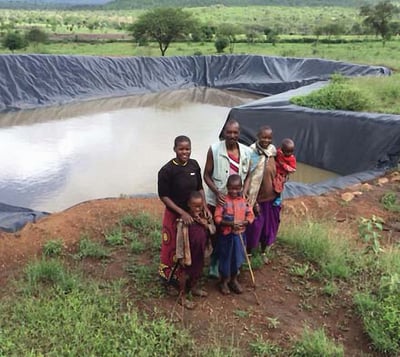 |
Amani Leking’orie was an innovator—and full of hope— even before he teamed up with World Vision. Now he said he feels the sky’s the limit with this strong partnership that blends his hard work with expert support.
Amani Leking’orie always knew he would be a cattle herder. That’s what Maasai men do in northern Tanzania. But climate change brought prolonged drought that made it difficult for him to earn a living for his family simply by raising cattle.
“For five years, the rains were not reasonable,” Amani said, explaining how dry weather caused his cows to lose energy and weight. “When it doesn’t rain, you wouldn’t wish to stay here for even one day.”
He realized he needed to diversify his income, so he started raising vegetables. Amani saw early on that he needed to plant raised beds and use terracing to retain the moisture in the soil.
“It was common sense,” he said.
World Vision staff introduced the idea of digging a water pan to use for irrigation and suggested lining it to retain more rainwater. Amani enlisted his family to help him dig it by hand and then World Vision facilitated his installation of drip irrigation.
World Vision agronomists introduced the zai-pit strategy—a foot-deep pit is dug inside a 4-by-4 foot square ridge of land and layered with manure and dirt. Seeds are planted and then covered with mulch. This method retains moisture and stops runoff, helping to grow improved varieties of tomatoes and other crops.
Amani and World Vision have partnered on other farm improvements, including planting trees to stop erosion on his hillside property and provide fodder for his cattle, which still play an important role for his family. And Amani has earned enough money to finance renting equipment to dig his second water pan.
World Vision’s training on a biblically empowered worldview and assistance with farming improvements have transformed his family’s life.
Amani said farmers now come from great distances hoping to replicate what they’ve done.
More importantly, he is confident he can feed his family. Eight of his nine children attend school; his youngest is still too little. He wants to build an improved home and continue to expand his farm.
“I feel amazing,” Amani said.







